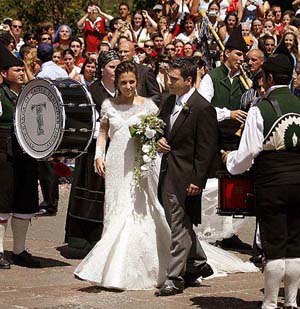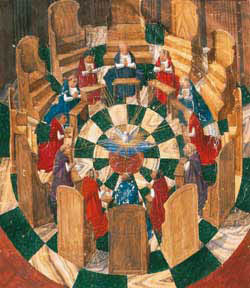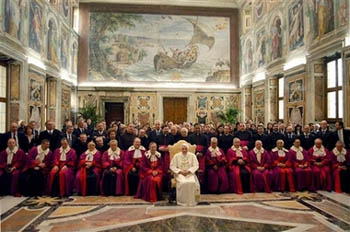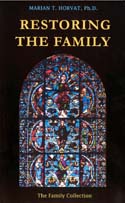 |
Morals
Moral Questions
Are Present Day Annulments To Be
Taken Seriously?
Fr. Paul Sretenovic
Dear TIA,
Recently I have read a response by the Rev. Fr. Paul Sretenovic on divorced parents and receiving them into the home. The question and answer are found here.
I thank his Reverence for this very clear and Catholic answer.
My questions are:
1. Are an adult child and his wife bound to accept a parent into their home if the latter has obtained an annulment which is very doubtful?
2. Would the child and wife be dishonoring the parent if, after seeking out and obtaining this "annulment" in the conciliar Church, the child does not allow the "spouse" of the remarried parent into their home?
Thank you for your time,
In Christ,
M.P.

Dear Mr. M.P.,
Thank you for your kind words and for your questions.
To seriously address your topics, we need to clarify what an annulment is and in what spirit annulments have been declared by the diocesan tribunals. Then we can see what should be the position of Catholic before it.
I hope that an overview of this problem may help you as well as other Catholics who have similar problems with annulments.
1. What an annulment is

Newlyweds in Covadonga, Spain, parade through the street as public ackowledgment of their marriage |
The juridical term annulment used for marriages means that the marriage that had been celebrated, recognized, and lasted for some time actually was not valid. This is an extremely grave sentence that cannot be given superficially for several reasons:
- The union had been celebrated by the parties according to all the Catholic requirements, before God, and witnessed by the representative of His Church.
- The union had been accepted by society as a true marriage, which means that the couple was known for living an honest conjugal life, and not in illicit concubinage.
- The stability of the family life, principally of the wife and children, had been guaranteed by the Catholic certainty that the matrimonial bond would never be broken.
These characteristics of the Catholic marriage are thrown out the window when an annulment is issued: the vows declared before God and the Church are considered void; the union is declared illegitimate, equivalent to a concubinage, and finally, the family life is completely broken with all the psychological and social consequences this entails. It is indeed a sentence disruptive of the life of the family and indirectly of all social life.
It is evident that to issue such a sentence, a tribunal must have very serious reasons and only do so very rarely.
2. The Pope and the Rota Romana: divorces and annulments
In juridical terms, an annulment is not a divorce. A divorce is the dissolution of the bond of marriage; an annulment is the affirmation that the bond never existed.
Marriage is a contract celebrated by two able Catholic persons of different genders before the Church and once consummated, it is not dissolvable. Divorce is and always was rejected by Catholic doctrine.

The Sacred Roman Rota, named Rota (wheel) because the 12 judges originally met seating in circle to discuss causes |
The only exception to this rule is the Pauline Privilege, which contemplates the case of marriages of persons of different religions wherein one of the spouses jeopardizes the eternal salvation of the other.
The competence to dissolve the vows of marriage falls to God or to His direct representative on earth, the Vicar of Christ. This is because the object of the vows of marriage is an external mutual donation of bodies, corresponding to an internal donation of souls, which can only be controlled by both spouses and God.
The Rota Romana, as an auxiliary organ for the Pope, carefully examines each particular case of dissolution of marriage. In the cases where this tribunal can not reconcile the spouses, the Rota Romana - which does not have power per se to dissolve marriages - counsels the Pope to do this or that. The final decision falls always to the Vicar of Christ.
An annulment is the affirmation that the marriage was not valid because an impediment was present when the marriage was celebrated. Only the Pope determines impediments. The Rota Romana is the superior tribunal of appeal for cases of annulments.
3. The competence of the Diocesan Tribunals
Regarding dissolution of the bonds of the marriage, the Diocesan Tribunals inform the Rota Romana of needed details regarding the marriage to be dissolved.
Regarding annulments, the Diocesan Tribunals are the normal first court to judge them. If a sentence issued by a Diocesan Tribunal is contested, the appeal goes in the second instance to an Archdiocesan Tribunal. If the case was first presented in an Archdiocesan Tribunal, the appeal goes to the tribunal of another Diocese, chosen for each Archdiocese according to its own history. The third instance of appeal is the Rota Romana.
Impediments
It normally falls to the Diocesan Tribunals, therefore, to deal with the cases of impediments for marriage.
What is an impediment for marriage? There are requirements established by the Natural Law or by the Catholic Church that must be observed for the marriage to be valid; when they are not observed, marriages are considered null. The Code of Canon Law studies the impediments, such as a minimum age limit - a young man has to be at least 16-years-old and the young woman at least 14 for the marriage to be valid; the persons cannot be brother and sister, or cousins in the first or second degree (there is a whole study on the degrees of consanguinity that governs this impediment); none of the parties can be clinically insane; neither can have an incurable contagious disease, etc.

The present day Roman Rota meets with Benedict XVI to mark the start of its judicial year |
Another set of impediments is based on fundamental error of person. In its first and elementary meaning, error of person was the case when the persons would conclude a marriage without knowing each other until the ceremony. This used to be the case of marriages arranged by proxies or correspondence, when the descriptions of the persons would depict a much different person than the reality.
In past times, when morality was the rule, it was common for a young woman to be a virgin until the wedding. If she was not, she knew that she should inform the groom because he could well consider the lack of virginity an error of person. Also the lack of virile potency in the groom was and still is an impediment. These two facts could only be verified on the nuptial night. Today, lack of virginity is no longer considered an impediment.
Various other impediments, however, could be found after that. For example, a man contracts a marriage with a woman and hides that he was married before. Whenever this is discovered, the harmed party must apply for an annulment. Also, a person who made the perpetual vow of chastity is not able for marriage. If he does marry, his marriage is invalid.
Those processes dealing with impediments normally fell to the Diocesan Tribunals. It has always been the normal competence of these tribunals.
In addition to the impediments, these tribunals also used to deal with cases of separation. When the life of a married couple became impossible to continue because of the bad moral conduct of one of the spouses or a complete incompatibility of temperaments, the tribunal or a spiritual director would counsel the spouses to adopt separate lives. This system of separation consists in ceasing to leave under the same roof, but does not break the sacramental bond. Also, the parties maintain the same obligation regarding the sharing of material goods and financial obligations as they had before the separation. Therefore, this permission for a separation would never imply either an annulment or the possibility of re-marriage.
These were the normal competences of the Diocesan Tribunals regarding marriage.
4. Abuses allowed by the New Code of Canon Law
After Vatican II, in the wake of adaptation to the modern world, the Holy See started to relax the bonds of marriage. The new Code of Canon Law of 1983 confirmed and gave a status of law to such tendencies. Since it cannot admit the dissolution of the marriage bond - which is divorce - without going against the centuries-old Moral teaching of the Church, it started to greatly exaggerate the concession of annulments.
Different from the 1917 Code of Canon Law, the new Code introduced some psychological impediments that are very difficult to ascertain. The person has an impediment to marry if he or she:
- Lacks sufficient use of reason;
- Lacks discretion regarding the rights and duties of marriage and the way to hand them over;
- Lacks psychological stability to assume the obligations of marriage (see Canon 1095, §§ 1,2,3).
To lack sufficient use of reason does not mean that the person in mentally insane. It relies on the vague concept of the adjective sufficient. Each judge may establish what that is following his own criterion. One sees how easy it is to annul a marriage under this pretext.
The second, lack of due discretion, has been applied with a large gamut of meanings. It may refer to a person who romantically imagined that the marriage would be wonderful and it turned out not to be; or it can also signify a person who at times experiences transitory disturbances of mind. In the latter case, a pre-marital pregnancy has been used as a pretext to annul the marriage, because the woman would be suffering from a transitory disturbance…
The third, psychological instability to assume obligations, also has been applied to a wide range of circumstances: it justifies annulments because of physical sexual defects other than impotence; for moral defects, such as an extra-marital affair (which may well be qualified as satyriasis for a man or nymphomania for a woman); for undefined psychological “defects,” such as a person who proves to be incapable of offering a “self-revelation” to the other. No doubt many marriages can be included in this vague criterion.

The Anglican Sect was born of the revolt against Pope Clement VII's refusal to annul Henry VIII's marriage with Catherine of Aragon, above.
|
Even though there are many other liberalizations in the new Code regarding impediments, these three psychological impediments represented, in my opinion, the hole in the dam. A whole flood of annulments broke loose because of them. Only in the United States between the years 1984 and 1994, 638,000 annulments were granted, approximately 59,000 per year (R. Jenks, Divorce, Annulments, and the Catholic Church, Haworth Press: 2002, p. 48). These annulments may be attained without too many problems by means of a fee of $600, or less, or even without it altogether. Thus, what we are witnessing today is the practical introduction of divorce, without the name. It is what has been called “the Catholic divorce.”
Such annulments were allowed by the conciliar Popes and the new Code of Canon Law that gave them the force of law. The Holy See granted the Diocesan Tribunals full authority to annul all the marriages they want.
I believe the reason for the change in Rome’s approach is primarily philosophical. The Church, in the conciliar and post-conciliar documents, has moved from her traditional rigor and objectivity to a subjective personalism which focuses on experiences more than on principles as the foundation for virtue, and yes, validity of marriages. As an illustration, if one were to open the book, New Commentary on the Code of Canon Law, which was commissioned by The Canon Law Society of America, one would find the following in reference to the very nature of marital consent:
“Although the 1917 Code had required only that parties know that marriage is a societas, a term that was often used for a business partnership, the revised code requires knowledge that it is a consortium, a partnership that involves mutual cooperation, support, and companionship” (p.1304).
In other words, if one of the spouses is deemed by the other not to be giving enough “time, love, and tenderness” to the other, this may be considered a defect in the consent at the time of marriage, and lead to an annulment. The very terms of the canons can be manipulated and packaged in a way that can lead to the obtaining of an annulment.
5. How should Catholics consider this situation?
There are two perspectives to distinguish when a Catholic faces this progressivist system of annulments: a moral perspective and a juridical one.
Moral perspective
It is extremely lamentable that since John XXIII, Holy Mother Church has been taken over by Progressivism, which tends to destroy her doctrine and institutions as much as it can. We are witnessing this on the dogmatic level - change of ecclesiology, change of the concept of Papacy, change of the notion of dogmas, change of the meaning of the Sacraments, etc - and also on the moral level. The inversion of the ends of marriage - love first instead of procreation - presented in the conciliar constitution Gaudium et Spes (§§ 48-52) was already a start that carried morality in the Church downhill to the point we see today.
A Catholic should know that this enormous liberalization in Morals is wrong, and that it is meant to destroy Catholic tradition on marriage. To help readers understand the fundaments of this revolution in marriage, I am asking TIA to post on its Documents of the Week page of its website, photocopies of the three mentioned paragraphs, followed by the official comments of the American Canon Law Society, so they can see how progressivist they are.
Once he knows the letter of the Code and its interpretation, the Catholic should resist it as much as he can according to Catholic doctrine and within the legal limits. That is, he should let others know as much as possible that these paragraphs introduced after Vatican II are the main reason for the deluge of annulments we are witnessing.
Juridical perspective
Since we are not sede-vacantists, that is, since we do not recognize any other authority but the Pope and the tribunals delegated by him to rule cases of marriage, we submit ourselves to the decisions of either the Holy See or the Diocesan Tribunals regarding this topic.
We believe that to do otherwise would be to increase the chaos already being caused by the present day annulments.
This means that, judicially speaking, we accept those annulments as valid. Although we don’t agree with the moral abuses that are being made we do not contest the juridical validity of the tribunal decisions.
In this regard, the position we take and advise others to take is the one that good sense tells us to take before bad judges, abusum non tollit usum [the abuse does not prevent the use]. The moral abuses of our ecclesiastical tribunals do not make their decisions void. Certainly the bad judges - in this case, the Bishops, the Rota Romana judges, and ultimately the Pope - will have to give an account to God for their decisions. But for the common Catholic, no other possibility remains but to accept them.
6. Answers to the questions
After this long explanation that sets the foundation for your questions and many others, I will now answer them:
A. Question: Is an adult child and his wife bound to accept a parent into their home if the latter has obtained an annulment which is very doubtful?
Answer: You say that the annulment is very doubtful. You don’t explain why. Let me suppose two possibilities.
• It is doubtful because you have concrete data that your parent lied or cheated in the process or bribed someone in the tribunal to give a sentence in favor of him. If this is the case, you have the moral obligation to present your evidence to the Diocesan Tribunal, and then if necessary to appeal its decision to a higher ecclesiastical court and await a final sentence. Until it comes, it is advisable not to receive the parent you are charging of dishonesty.
• It is doubtful because, generally speaking, you don’t believe in the whole system of annulments as it was established after Vatican II. This doubt would be a moral doubt, regarding the legitimacy of these sentences. This hypothesis falls into what I have discussed before. I agree that a serious moral doubt exists: we should resist this liberalization and try to stop it by letting others know how bad those canons are. But in the juridical realm, a Catholic should accept the sentences of the tribunals.
Thus, if an annulment was issued declaring the marriage of your parents void, the new marriage of your father or mother is considered valid. So, you can receive your parent and his (new) wife, given that the Church gave her approval. There would be no fault for the son or daughter to allow the mother or father in question into the home, as well as the new spouse. The parent and the (new) spouse are not, in canon law terms, notorious sinners to be deprived Holy Communion.
However, this does not mean that you are bound to receive them at your house. You may express to your parent that even though you accept the validity of the juridical sentence of the ecclesiastical tribunal, you have doubts about the legitimacy of the moral orientation being followed.
This is my answer to your first question.
B. Question: Would the child and wife be dishonoring the parent if, after seeking out and obtaining this "annulment" in the conciliar Church, the child does not allow the "spouse" of the remarried parent into their home?
Answer: No, the child would not be dishonoring the parent. One would not be dishonoring the parent by never allowing the new spouse into the home, even when he or she is alone. The child has sufficient moral reasons to do this, as I have explained. The child of such a parent would be free to accept or to reject the spouse, depending upon how strongly he or she feels about what was alleged as the cause for the annulment, which will vary from case to case contingent on circumstances.
I hope that I have answered your questions satisfactorily.

Posted May 12, 2008

Related Topics of Interest
 Divorced Parents; Unwed Mothers Divorced Parents; Unwed Mothers
 A Refresher on Catholic Teaching about Marriage A Refresher on Catholic Teaching about Marriage
 Problems and Solutions: Natural Marriage and Civil Marriage Problems and Solutions: Natural Marriage and Civil Marriage
 'Catholic Divorce" Speed Up 'Catholic Divorce" Speed Up
 Annulments - Comments by Readers Annulments - Comments by Readers
 Vatican II Inverted the Ends of Marriage Vatican II Inverted the Ends of Marriage
 Condoms I: Traditional Catholic Teaching on Birth Control Condoms I: Traditional Catholic Teaching on Birth Control
 Problems of Conscience on Marriages, Live-ins, Baby Showers Problems of Conscience on Marriages, Live-ins, Baby Showers
 Unwed Mothers: the Calvinist and the Catholic Answers Unwed Mothers: the Calvinist and the Catholic Answers


|

Morals | Religious | Home | Books | CDs | Search | Contact Us | Donate

© 2002-
Tradition in Action, Inc. All Rights Reserved
|
 |
|